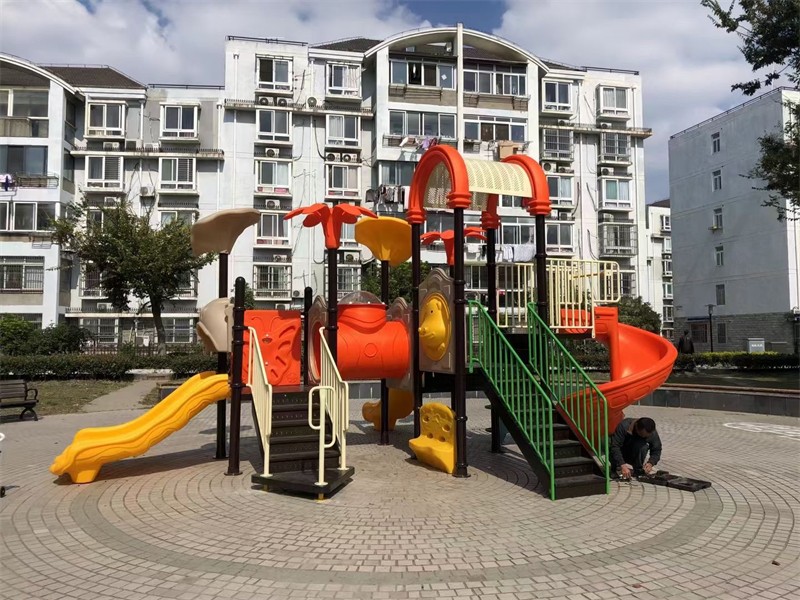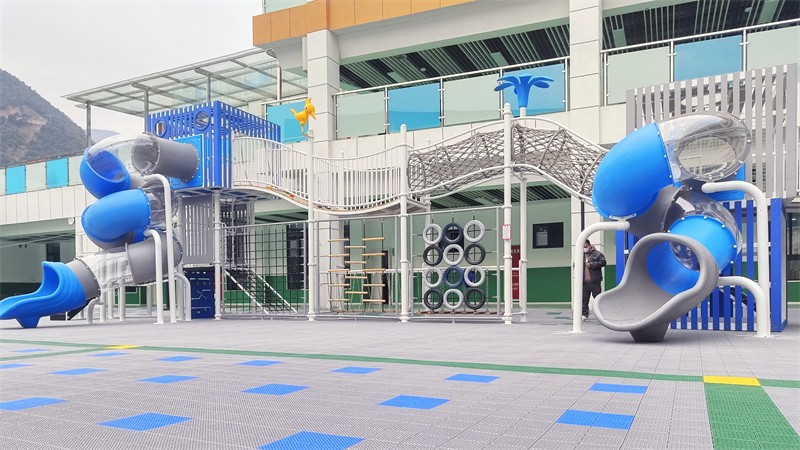When choosing a kindergarten slide, the material you choose directly impacts safety, durability, and user experience. As a leading manufacturer with over 30 years of experience, Zhejiang Feiyou Fitness Equipment Co., Ltd. combines industry standards with practical applications to provide an in-depth analysis of the differences between three mainstream materials, focusing on safety, durability, cost, maintenance, and climate adaptability, and offers exclusive purchasing strategies.
I. In-Depth Comparison of Material Characteristics
1. Plastic Slide: Best Value for Money, Flexible Adaptability
Core Advantages:
Outstanding Safety: Made of imported food-grade polyethylene (PE) or polypropylene (PP), these slides are GB 6675-2014 toy safety certified, eliminating the risk of heavy metal migration. The die-cast surface treatment achieves a coefficient of friction of 0.4-0.6, surpassing the anti-slip performance of metal.
Excellent Weather Resistance: The addition of UV inhibitors (such as carbon black) and antioxidants allows them to withstand temperatures ranging from -30°C to 70°C and remain stable in acid rain and salt spray environments. Tests in the extremely cold regions of Northern Europe show that PE slides show no signs of brittleness even at -20°C.
High Design Freedom: Roto-molding allows for complex shapes such as wavy and spiral forms, with color durability exceeding 8 years.
Potential Limitations:
High Temperature Hazard: Surface temperatures can reach over 60°C after exposure to the sun in summer, potentially causing burns to children. A sunshade or matte finish is recommended.
Limited Impact Resistance: Slides less than 3mm thick are prone to cracking; a wall thickness of 5mm or greater is recommended.

2. Wooden Slides: A Balance of Natural Aesthetics and Safety
Core Advantages:
Natural Appeal: Made of Russian pine or Huanghuali wood, finished with an environmentally friendly wood lacquer, they offer a soft, tactile feel, embodying the concept of "nature-based education." The mortise and tenon joint structure reduces metal joints, minimizing the risk of pinching.
Improved Safety: Wood has an elastic modulus of 10-12 GPa, offering superior impact cushioning compared to plastic, absorbing 30% more impact force.
Environmentally Sustainable: FSC-certified wood is recyclable and has 40% lower carbon emissions than plastic.
Maintenance Pain Points:
High Anti-Corrosion Cost: Wood wax oil is required every six months, and additional moisture-proofing treatments (such as raising the base by 30cm) are required in humid areas. Annual maintenance costs are approximately 10% of the initial cost.
Weather Resistance: Prone to cracking under long-term exposure. For rainy areas, teak or ACQ-treated wood is recommended.
3. Stainless Steel Slides: The benchmark for durability, suitable for frequent use.
Core Advantages:
High Structural Strength: 304 stainless steel has a tensile strength of ≥520 MPa and can withstand a static load of 500 kg, making it suitable for large modular slides.
Easy to clean and stain-resistant: Surface roughness Ra ≤ 0.8μm, with a bacterial adhesion rate 70% lower than plastic, making it suitable for medical or high-hygiene applications.
Extremely long service life: In coastal environments with high salt spray, 316 stainless steel slides can last over 20 years, with maintenance costs only one-third that of plastic.
Restrictions on use:
Temperature sensitivity: Surface temperatures can reach over 50°C in summer, requiring sunshades or a matte finish to reduce heat absorption.
Limited styling: Complex curved surfaces are expensive to process, and spiral slides are 50% more expensive than plastic models.

II. Pitfall Avoidance Guide and Industry Trends
1. Three Major Purchasing Traps
Low-cost plastic slides: Be wary of recycled materials (density < 0.94g/cm3), which are prone to brittleness and cracking. Requesting a RoHS test report is recommended.
Fake Anticorrosive Wooden Slides: Verify that the wood has been vacuum-treated with a preservative (such as the ACQ-D formula) to avoid "fake anticorrosive" treatments that are painted on the surface.
Non-standard Stainless Steel: 304 stainless steel must have a nickel content of 8% or higher, which can be tested with a spectrometer to eliminate "stainless steel" imitations.
2. New Material Trends in 2025
Composite Material Applications: Slides with a stainless steel frame and HDPE plastic panels offer both durability and safety, at a price 20% lower than all-stainless steel.
Environmental Upgrades: Biodegradable plastics (such as PLA) and FSC-certified wood are becoming the top choices for high-end kindergartens, reducing carbon emissions by 30% compared to traditional materials.
Smart Temperature Control Technology: Some high-end slides have built-in thermal coatings, keeping the surface temperature below 40°C in summer.
III. Maintenance Recommendations:
Plastic Slides: Wipe with a neutral detergent monthly and inspect the UV-resistant coating quarterly for signs of aging.
Wooden slides: Apply wood wax oil before the rainy season, clear snow in winter, and inspect the mortise and tenon joints.
Stainless steel slides: Passivate annually, and in coastal areas, inspect for salt spray corrosion every six months.
When selecting a material for a kindergarten slide, consider three key factors: safety compliance, environmental adaptability, and educational functionality. Plastic slides are known for their cost-effectiveness and flexible design, wooden slides offer a natural aesthetic, and stainless steel slides excel in durability. Industry trends for 2025 indicate that the combination of composite materials and smart technology will become mainstream, with environmental protection and safety remaining uncompromising. It is recommended to prioritize products certified under GB 6675 and work with professional manufacturers for custom design to ensure a safe, fun, and sustainable play space for children.
+86-13566236059
#16 Chuangqiang Road, Light industrial area, Lucheng district, Wenzhou city, Zhejiang Province, China.
+86-577-85951908
+86-577-86457291
